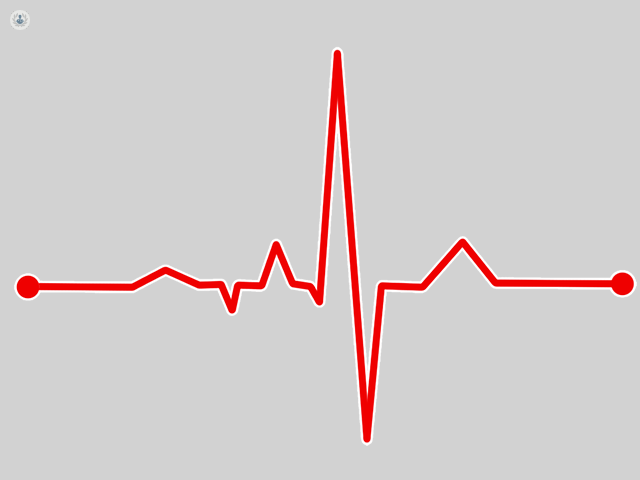Diagnosing heart arrhythmias with electrophysiology
Written by:The heart is controlled by electrical activity. It contains nodes that generate electrical impulses, which usually travel through the heart in a regular pattern. Arrhythmia is when the rhythm of these impulses becomes irregular, causing the heart to beat in an uneven pattern.
An electrophysiology study (EPS) shows the pattern of the heart rhythm. This diagnosis method consists of two parts:
- the first part is the diagnosis of what is causing the arrhythmia, and;
- second is the treatment (in which the thing that is causing the heart arrhythmia is fixed or destroyed by ablation).
In the article below, esteemed consultant cardiologist Dr Digoarachi S Bulugahapitiya tells us how exactly an electrophysiology study is used to diagnose the root cause(s) of arrhythmia.

How is an electrophysiology study used to diagnose the cause of arrhythmia?
An electrophysiology study is performed in a cardiac catheterisation laboratory. One or more catheters are inserted through the patient's groin and pass through the femoral vein to the heart. Occasionally it may be necessary to enter through other blood vessels. The catheters are usually monitored with X-rays to ensure they’re in the right place.
During the EPS, the electrical activity in different areas of the heart can be recorded with the catheters to determine what type of arrhythmia the patient has and where it originates. Once the problem is identified, it can be treated.
When does treatment of the heart arrhythmia begin during EPS?
Treatment is often performed during, or immediately after an electrophysiology study. The doctor may decide a pacemaker or ICD implant is needed, but in some cases, the damaged part of the heart that has caused the arrhythmia may need to be destroyed by ablation.
There are two types of ablation, the most frequent being:
- radiofrequency (which destroys by heating) and;
- second, cryotherapy (destroys by freezing). The end of the ablation catheter rests on the area where the arrhythmia is generated and energy is applied to eliminate it.
Most electrophysiology studies are performed under local anaesthesia, with the patient mildly sedated, allowing the patient to communicate during the procedure. In some cases, it may be necessary to use general anaesthesia. An EP study cures most of the arrhythmias originating in the different chambers of the heart (atria and ventricles). Many of these arrhythmias significantly reduce the quality of life of the patient and some may even endanger their lives.
Is this a definitive treatment for arrhythmia, and how long does it last?
An electrophysiology study is a definitive treatment for arrhythmia, and avoids hospitalisation and drugs (none are curative and may have significant undesirable effects). An EP study lasts approximately two hours, although in complex cases it can be significantly longer. The patient is usually discharged home within 24 hours, unless there is a complication.
Arrythmia management specialists
An EP study should be performed by electrophysiologists – cardiologists specialising in the management of arrhythmias, for which they have had to obtain specific accreditation after a very demanding training period.
To book a consultation with Dr Digoarachi S Bulugahapitiya, simply visit his Top Doctors profile today.


